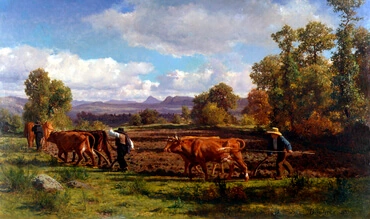Terreno

Existe alguma diferença no significado entre "terra" e "solo"? No início não parece; ambos se referem ao solo que compõe a massa terrestre do planeta que habitamos.
Mas se pensarmos bem, os significados são sombreados em diferentes direcções. Nós tendemos a usar "terra" num sentido mais geral - significando todo o solo em toda a parte ou qualquer solo em qualquer lugar. "Terra" é mais específico, referindo-se à porção de terra em que nos encontramos, ou a alguma porção de terra que pretendemos cultivar ou usar de outra forma.
E assim está na Bíblia. "Terra" refere-se ao exterior de uma pessoa ou de uma comunidade - seus pensamentos e ações cotidianas - em um sentido amplo e geral. "Terra" refere-se às partes de nossas vidas externas que estão prontas para o cultivo, prontas para serem postas em uso.
O cultivo, claro, envolve afrouxar o solo (quebrando nossos hábitos e pensamentos distrativos) e plantar sementes (verdadeiros conceitos e idéias que brotam de um desejo de ser bom). À medida que essas sementes começam a crescer, nós começamos a ser verdadeiramente úteis.
Em resumo, então, "terra" na Bíblia pode significar uma pessoa ou comunidade que é receptiva aos ensinamentos do Senhor. Pode também significar uma pessoa ou igreja que tenha recebido o ensinamento do Senhor e o esteja pondo em uso.
(Odkazy: Arcanos Celestes 94, 268, 345, 377, 566, 1068, 2327, 6135 [1-2], 6154)
Arcana Coelestia # 1610
1610. That 'I will make your seed as the dust of the earth' means being multiplied beyond measure is clear without explanation. Here it is said that his seed would be made as 'the dust of the earth', in other parts of the Word as 'the dust of the sea', and in yet other parts as 'the stars of heaven'. Each of these phrases has its own particular meaning. 'Dust of the earth' has regard to those things that are celestial, for, as shown already, 'the earth' means the celestial aspect of love; 'dust of the sea' has regard to those things that are spiritual, for 'the sea', as has also been shown, means the spiritual aspect of love; while 'as the stars of heaven' means both but in a higher degree. And because these things cannot be numbered they therefore became common expressions to describe growth and multiplication beyond measure.
[2] The statement that his seed, that is, the faith that is the expression of love, or simply love, was to be multiplied beyond measure means in the highest sense the Lord, and in particular His Human Essence, for the Lord as regards the Human Essence is called 'the seed of the woman', dealt with in 256. When the Lord's Human Essence is meant, the infinite celestial and spiritual is understood by the words 'multiplied beyond measure'; but when faith that is the expression of charity, or simply charity, among the human race is meant by 'the seed', the multiplication without measure of that seed in everyone who leads a charitable life is understood. Such multiplication takes place in the next life with everyone who leads a charitable life. With him the multiplication of charity and of the faith deriving from it, together with their associated happiness, is so great that one can only describe it as being beyond measure and defying description. When the human race is meant by 'the seed', the multiplication of this in the Lord's kingdom is also beyond measure - not only from those who are inside the Church, and their children, but also from those who are outside the Church, and their children. Consequently the Lord's kingdom or heaven is boundless. That boundlessness will in the Lord's Divine mercy be spoken of elsewhere.






